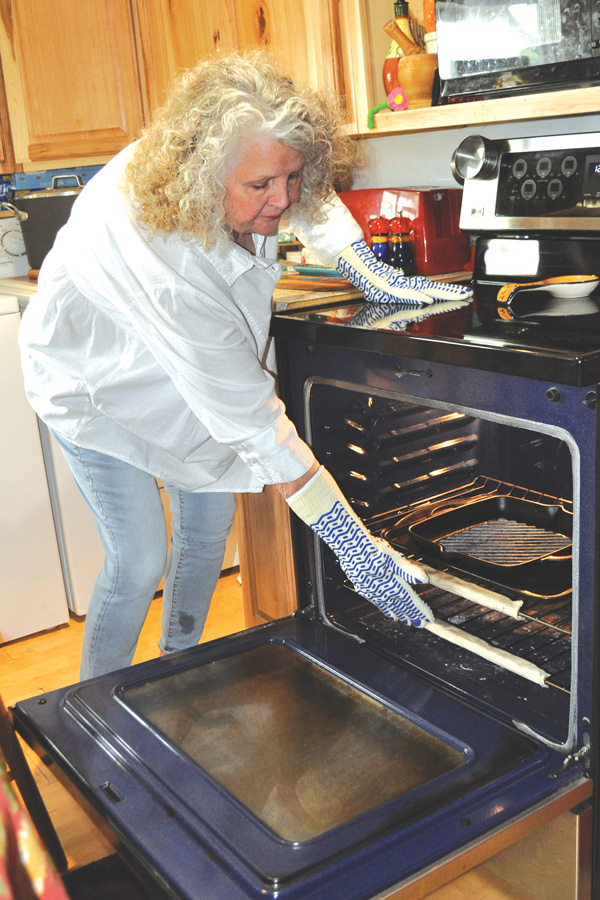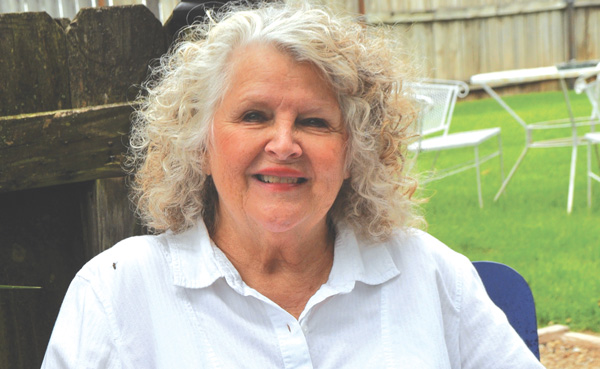
Mary Ann Pawless, like millions of Americans, wonders how Katie Thurston’s journey will end this season on “The Bachelorette.”
The dating show is one of several shows the Lawton woman looks forward to watching each week, but that hobby was at risk because of her struggles with macular degeneration, a common eye disorder among people over age 50 that causes blurred or reduced central vision.
Pawless sought help with her vision issues from the Oklahoma Department of Rehabilitation Services’ Older Blind Independent Living Program. The staff teach independent living skills, adaptive aids and alternate techniques. Areas of support include help with reading tasks, time telling, name signing, orientation and mobility for clients in their home and community. Clients are also taught money identification and management, recreation and leisure activities and multiple independent living skills.
Pawless demonstrated how she uses a handheld magnifier with a light to read an adjustable magnifying glasses that enable her to watch her favorite TV shows including the ABC reality series. Each week she follows along as the men wait to see who will not receive the final rose and are sent home.
“For a while there it was, poor me,” Pawless said. “I didn’t have the desire to try to do too much. I just kind of scooted around, but now it’s kind of like a whole new world they’ve opened up for me. I used to get kind of depressed, but that’s very rare now because I stay busy at home and doing the yard.”
DRS also helped in other areas of her life. Pawless has black tabs on her stove and microwave that help her identify numbers and has a pair of elbow length oven mitts to prevent accidentally burning her arm while using the oven. She also listens to audiobooks from the Oklahoma Library for the Blind and Physically Handicapped, a program associated with Services for the Blind and Visually Impaired that provides audio books and audio equipment.
The Oklahoma Older Blind Independent Program provides one-on-one teaching for Oklahomans ages 55 and older who are struggling with vision loss and blindness. A large percentage of the staff are blind or have low vision and are located in offices throughout the state to help individuals regain their independence in a safe and efficient way at no cost to the client.
Pawless’ rehabilitation teacher Pam Holloway is also blind. Holloway helped Pawless to be creative around her house, such as using a rubber band to identify her shampoo and conditioner. Pawless’ orientation and mobility specialist Liz Scheffe taught her how to navigate outside and use her white cane. With her newfound independence, Pawless is now able to live life to the fullest again and has recovered from the depression that came with losing most of her vision.
Pawless, her husband and dog, Biscuit, live in a cabin with a beautiful garden across from Mount Scott. Her hobbies include listening to audiobooks, cooking and working in her garden. She enjoys spending time with her grandson and neighbors.
“The Older Blind program means that our staff can give something to older blind individuals that they might not get anywhere else, and that is their independence to perform tasks for themselves,” Services for the Blind and Visually Impaired Field Services Coordinator Teresa McDermott said. “There is nothing more joyous than to hear a client say they never thought they would be able to read a piece of mail or a medicine label again, or cook a meal on the stove, but they can now, as a result of services from our staff.”
For more information about DRS services, call 800-845-8476 during business hours to be transferred to the nearest office or visit:
https://oklahoma.gov/okdrs/independence/blind/older-blind.html.
The Older Blind Independent Living Program is part of the Service for the Blind and Visually impaired division of DRS, a state agency that assists Oklahomans with disabilities through vocational rehabilitation, education, employment, independent living programs and the determination of medical eligibility for disability benefits. Last year, DRS served more than 76,000 Oklahomans.














